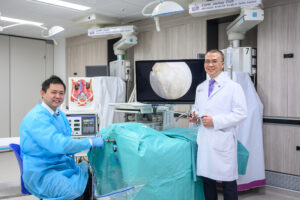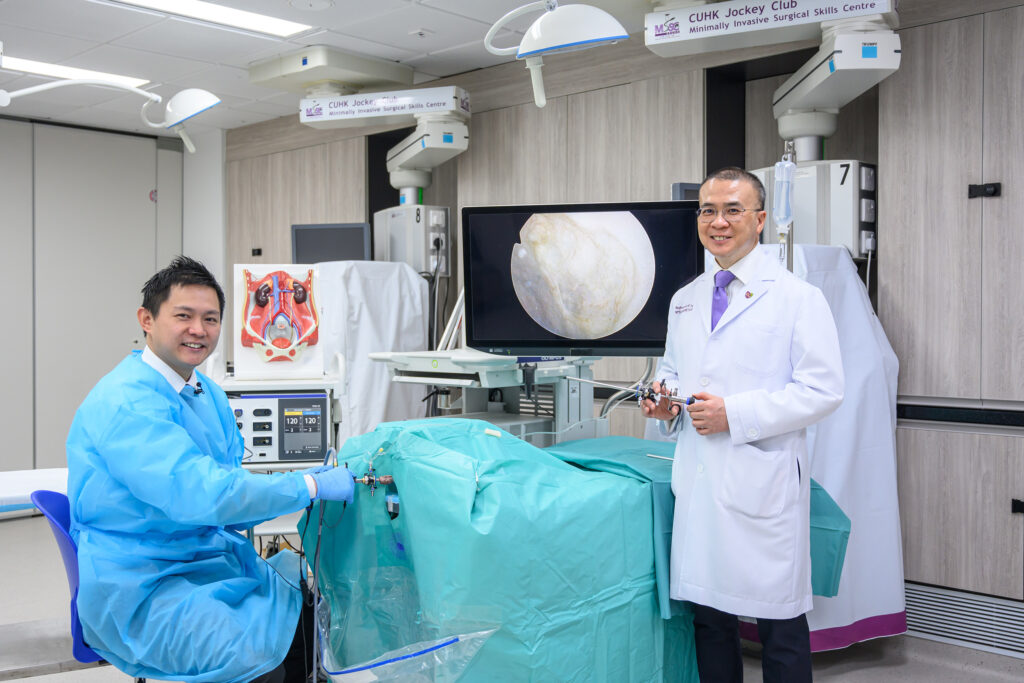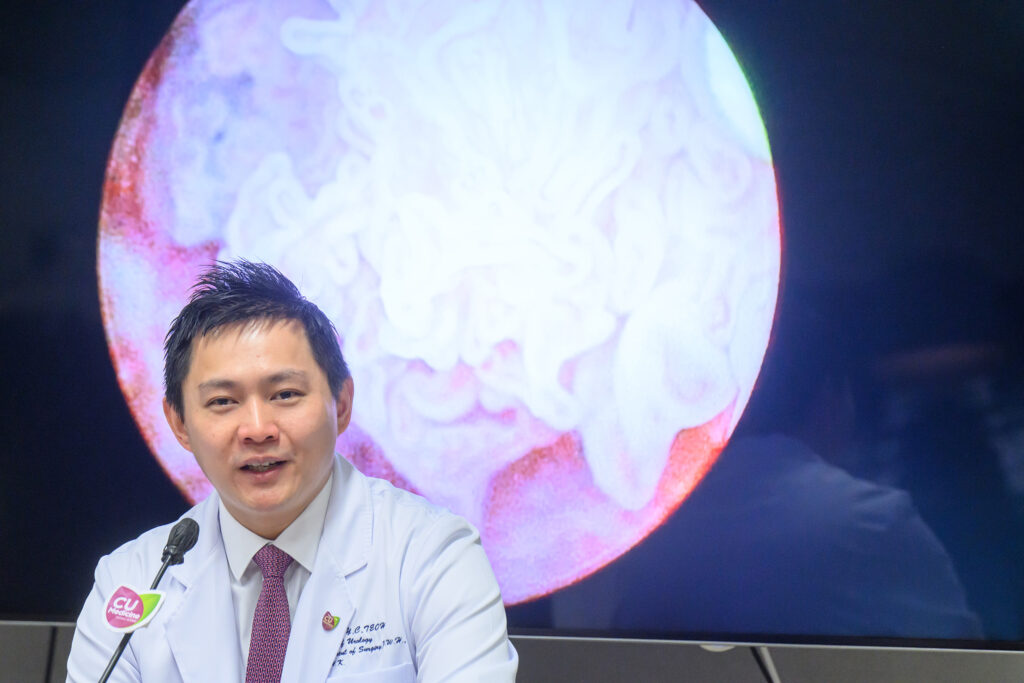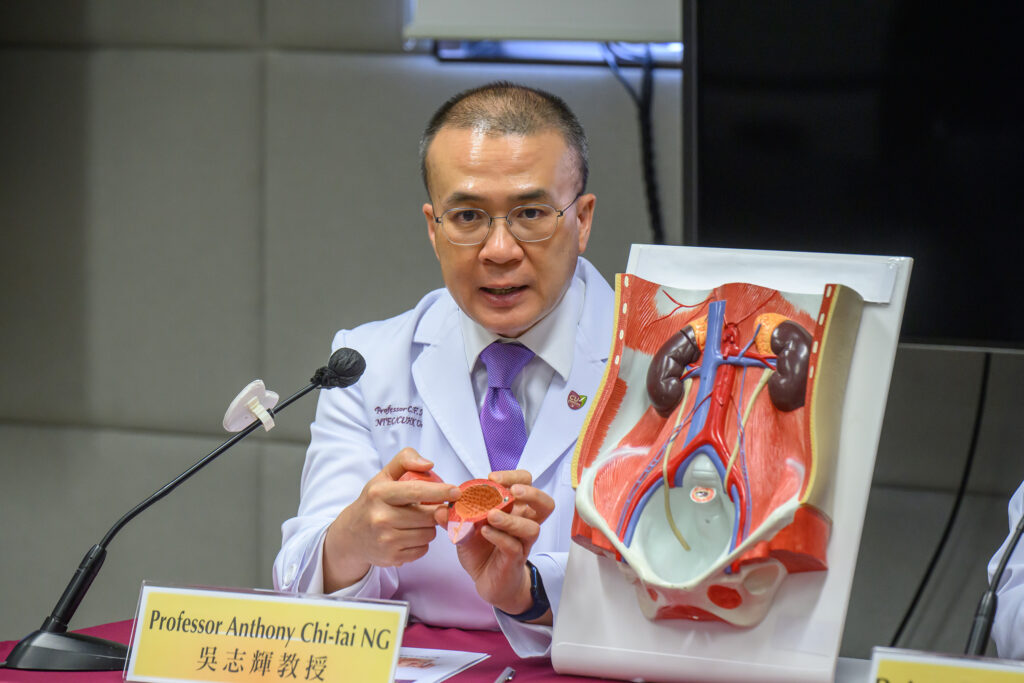CUHK
News Centre
CUHK study demonstrates a significant benefit from en bloc resection of bladder tumours in reducing tumour recurrence over conventional transurethral resection
The Chinese University of Hong Kong’s (CUHK) Faculty of Medicine (CU Medicine) has conducted the world’s first randomised clinical trial that demonstrates a significant benefit from en bloc resection of bladder tumour (ERBT) in reducing tumour recurrence, compared with conventional transurethral resection of bladder tumour (TURBT). Study results showed that using ERBT reduced the one-year recurrence rate of bladder tumours from 38% to 29%. After adjusting for patient and disease factors, the risk of cancer recurrence in patients receiving ERBT is 40% lower than that in those receiving TURBT.
This study is a milestone in proving ERBT can be the first-line surgical treatment for bladder cancer patients with a non-muscle-invasive tumour of 3cm or smaller. Details of the study have been published in the prestigious international journal European Urology.
En bloc resection minimises the risk of tumour seeding compared with conventional resection
Bladder cancer is a major urological disease and among the top 10 most common cancers in the world. About 75% of bladder cancer patients present with non-muscle-invasive bladder cancer with a tumour size about 3cm or smaller. TURBT is the conventional standard resection, which involves using a cystoscope to enter the bladder through the urethra, and then resecting the bladder tumour in a piecemeal manner. However, this kind of resection results in floating tumour cells, which can reimplant on the bladder wall and lead to cancer recurrence. Tumour specimens are also fragmented and it is not possible to assess the resection margin. Whether complete resection can be achieved or not depends on the surgeon’s expertise.
ERBT has been proposed as an alternative technique for treating non-muscle-invasive bladder cancer. The chance of cancer recurrence after ERBT could be reduced, as the tumour is removed in one piece and the risk of cancer cell reimplantation is low. Complete tumour resection can be ascertained by cell examination under a microscope, while clear resection margins can be achieved in 94 to 99% of cases, according to previous studies.
In this multicentre study, 350 bladder cancer patients from 13 hospitals in Hong Kong were randomly assigned to receive ERBT or TURBT at a 1:1 ratio. The tumour size of all participants was 3cm or smaller. Using statistical analysis, the cancer recurrence rate was 29% in the ERBT group after receiving treatment for one year, which is significantly lower than the 38% recurrence rate in the TURBT group. Similarly, the rate of one-year progression from non-muscle-invasive bladder cancer to muscle-invasive bladder cancer dropped from 2.6% in the TURBT group to 0% in the ERBT group.
A milestone in proving that ERBT can be the first-line surgical treatment
Dr Jeremy Teoh Yuen-chun, Associate Professor in the Division of Urology at CU Medicine’s Department of Surgery, stated, “In 2020, we carried out a very comprehensive review of the scientific evidence regarding ERBT and developed a consensus statement that provides guidance for healthcare professionals who practise it. Through this newly published randomised clinical trial, we can show the clinical benefits of ERBT, which support it as the first-line surgical treatment for bladder cancer patients with non-muscle-invasive tumours of 3cm or smaller.”
Professor Ng Chi-fai, Tzu Leung Ho Professor of Urology in the Department of Surgery at CU Medicine, added, “The multicentre setting of our study demonstrates the generalisability of ERBT across different surgeons and centres. With proper surgical training and education, this new form of surgical technique can be effectively disseminated, translating our study results into clinical benefits for bladder cancer patients.”
For more detailed information, please refer to the full study: https://www.sciencedirect.com/science/article/pii/S0302283824023212

CU Medicine has conducted the world’s first randomised clinical trial that demonstrates a significant benefit from en bloc resection of bladder tumour (ERBT) in reducing tumour recurrence. Compared with conventional transurethral resection of bladder tumour (TURBT), the new surgical procedure reduces the risk of cancer recurrence in patients by 40%.
The study is led by Professor Ng Chi-fai (right), Tzu Leung Ho Professor of Urology; and Dr Jeremy Teoh (left), Associate Professor, from the Division of Urology in the Department of Surgery at CU Medicine.

Dr Jeremy Teoh states that the newly published randomised clinical trial demonstrates the clinical benefits of ERBT, supporting it as the first-line surgical treatment for bladder cancer patients with non-muscle-invasive tumours of 3cm or smaller.









